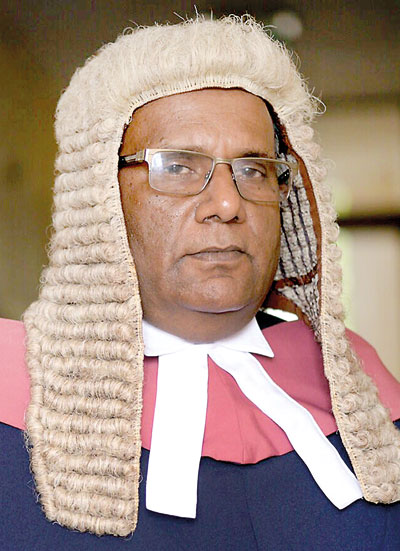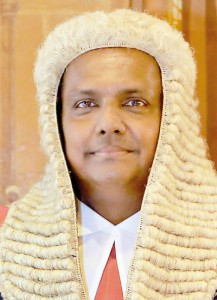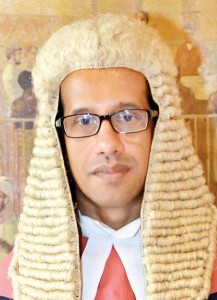News
Judicial integrity and legal delays topical at ceremony for new Appeal Court judges
Judges should strive to conduct themselves in a way that will sustain and contribute to public respect and confidence in their integrity, impartiality and good judgement, Attorney General Jayantha Jayasuriya P.C. said on Friday.

Justice Gamini Amarasekera
“Public confidence in, and respect for the judiciary are essential to an effective judicial system and ultimately to democracy founded on the rule of law. A factor which is capable of undermining public respect and confidence is any conduct of judges, in and out of court, demonstrating a lack of integrity,” the AG noted.
He made these comments while addressing the ceremonial sitting to welcome three new justices to the Court of Appeal. They are Justices Gamini Rohan Amarasekera, Anthony Lalith Shiran Gooneratne and Janak De Silva.
He said that all three judges have the virtues, qualities, expertise, experience and skills needed to serve society in their respective capacities. “True impartiality does not require that the judge have no sympathies or opinions, it requires that the judges nevertheless be free to entertain and act upon differing points of view with an open mind.” the AG said.
Justice Gamini Amarasekera in his address spoke on the issue of laws delays. “During 29 years I spent as a Magistrate, District Judge and High Court Judge, I have seen many attempts made without success to add to this issue. It is my genuine feeling that lawyers shall not misuse the term “personal grounds” to get postponements. I request the members of the legal profession to use the time allocated for a case in a productive and effectual manner,” he said.
Justice Amarasekera added that for a sustainable democracy and good governance that guarantees equal treatment and equality before law, there must be a well performing judicial system which comprises honest, educated and independent judges and lawyers who jealously defend the rights of the people.
“There may be many organisations that voice the struggle for rights of the people but we must remember it is only us, judges and lawyers, who can protect and defend the rights of the people. Therefore, all of us belonging to the legal fraternity must not see our profession as a mere livelihood but a mission entrusted to protect human dignity,” he added.

Justice Shiran Gooneratne
Justice Shiran Gooneratne in his address also spoke on the perennial problem of laws delays. “Considering the vast number of meetings, discussions and seminars that have been held on this subject, one would be excused for thinking that the problem of laws delays, would be resolved or at least minimised. Unfortunately, laws delays are still prevalent, if not worse than before,” he said.
Justice Goonaratne said that the delays could be attributed mainly to the legal system, members of the bar, and judiciary.
With regard to the legal system, he said, the authorities have come up with possible solutions such as those at the pretrial stage while with regard to delays due to the bar the Bar Association is continuing in its quest to find answers.
With regard to delays attributed to the judiciary, Justice Amarasekera referred to a report dated June 30, 1985 titled, “The Sri Lanka Law’s Delays and Legal Culture Committee” which was headed by the late Justice R. S. Wanasundara, retired judge of the Supreme Court, and included the late justice M. C. Sansoni, retired Chief Justice of the Supreme Court and Justice J.F.A. Soza, retired judge of the SC.
“The gist of Mr. Wijewardena’s observations not only with regard to laws delays, but also generally, with regard to what is expected of a presiding judge, was that a firm, diligent and independent judge can to a great extent eliminate laws delays, especially delays in open court,” he said.
Justice Janak De Silva in his address said that equity before the law is one of the principles in Dicey’s exposition of the Rule of Law. It is a fundamental right embodied in our Constitution. Traditionally the focus is to ensure that the law is applied equally to all. In my view this is achievable only when litigants and their counsel are treated equally,” he said.

Justice Janak de Silva
He referred to the words of Sir Gerard Brennan, the Chief Justice of Australia who said that “the judge will not succeed and will not find satisfaction in his or her duties unless there is a continual realisation of the importance of the community service that is rendered.”
Justice De Silva said that it is with the full assistance of the bar that justice can be meted out according to law. “Such collaboration is achievable only if there is a cordial relationship between the bench and the bar. Judicial office must be given its due honour. However it is not a one way street. Judicial office is not a license to disparage or demean counsel. They must be treated with due respect and honour which all counsel appearing before me will receive,” he added.
Bar Association President U.R.de Silva P.C. in his address said that in the life of the citizens of a state, the judiciary is a source of confidence and fearlessness.
“The common man depends on the judiciary for justice. Without the security of rights and freedom guaranteed by the judiciary, they can’t hope to carry out their employment and enjoy living. Without judicial protection, their lives can become miserable.” he said.
Mr. de Silva also said that three eminent personalities in the field of law are assuming their rightful place with their elevation to the court of appeal.

